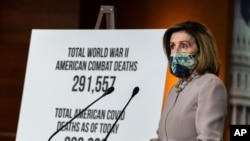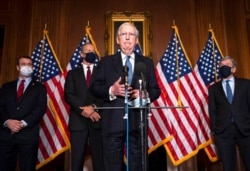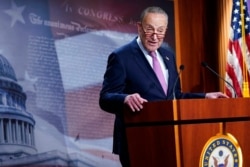U.S. lawmakers are closing another week of work on Capitol Hill without reaching an agreement on a second round of coronavirus aid. Leadership in both parties warned Thursday that time is running out to break the deadlock on extending programs that are helping millions of Americans weather the economic impact of closures due to the coronavirus pandemic.
House Speaker Nancy Pelosi, a California Democrat, told reporters the negotiations that have dragged on for several months are now making “great progress.”
Lawmakers will buy themselves another week of time to negotiate a deal on coronavirus aid by passing a one-week extension of government funding that was set to expire on December 11. With time running out ahead of the holidays and the start of a new Congress in early January, legislators are expected to combine any deal reached on aid with a longer-term extension of government funding.
“We can’t go before the package is ready and both are there,” Pelosi said, leaving open the possibility that Congress would need time after the 18th to work out both pieces of legislation.
According to data released Thursday, 1.4 million Americans filed new unemployment claims last week, bringing the total number of unemployed receiving aid to 19 million people. If lawmakers do not reach an agreement, an estimated 12 million people will lose aid on December 26. Student loan debt relief as well as eviction moratoriums impacting an estimated 40 million Americans are also set to expire at the end of the month.
“We should be doing everything we can to prevent layoffs, create jobs where possible, and race toward the vaccines that will end this nightmare,” Senate Majority Leader Mitch McConnell, a Kentucky Republican, said on the Senate floor Thursday.
Earlier this week, McConnell proposed setting aside the two elements that have prevented the sides from reaching an agreement in order to break the deadlock. Noting that lawmakers expect to work on a new round of aid in January when the new Congress comes into session, McConnell said the Republicans’ insistence on liability protections for businesses, schools and churches could be set aside along with Democrats’ demands for aid for state and local governments.
"While Democrats hold the Paycheck Protection Program hostage over controversial state government bailouts, family businesses are closing their doors. While Democrats resist the kinds of common-sense legal protections that we’ve put in place during past emergencies, our reopening and recovery is threatened by — according to one estimate — more than 6,500 lawsuits and counting," McConnell said.
Congressional Democrats rejected that offer, saying without aid to the cities and states, emergency workers may be laid off from their jobs.
“Each side wants something that the other side doesn't want to accept,” Senate Minority Leader Chuck Schumer said on the Senate floor Thursday. “This is a false equivalency — incredibly false — for two reasons. First, state and local aid has broad bipartisan support, totally unlike the Republican leaders’ liability provision which is expressly partisan.”
U.S. Treasury Secretary Steven Mnuchin on Tuesday proposed a $916 billion aid package that has the support of President Donald Trump and congressional Republicans. Pelosi and Schumer have said that a $908 billion bipartisan proposal released last week should be the starting point for negotiations.
Lawmakers from both sides of the aisle have called for an additional round of direct payments to offset the impact of business closures and restrictions. Earlier in the year, many Americans received as much as $1,200 in direct payments after the first round of closures to limit the spread of the pandemic.
The number of coronavirus infections has been rising sharply in recent weeks, with the United States reaching more than 200,000 cases per day for the first time all year. The so-called third wave of infections could jeopardize the gains the U.S. economy has made in recent months, due in part to the first round of aid passed by the U.S. Congress in late March. The bipartisan $3 trillion CARES Act was the largest aid package in U.S. history.






